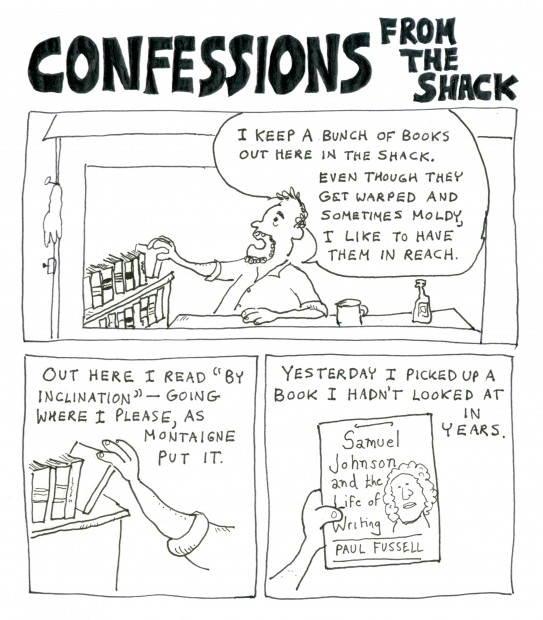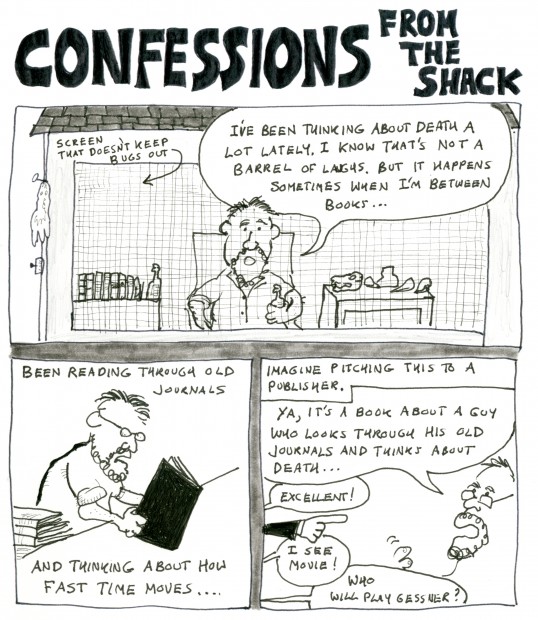Cocktail Hour
Table for Two: An Interview with Nina de Gramont on Publication Day
categories: Cocktail Hour / Table For Two: Interviews
comments: 3 comments

Bill and Dave’s doesn’t always pay for a private jet to Cape Cod for lobster rolls at the Sesuit Harbor Café, nor for 12 professional parachutists to fly our subject safely down to Earth and our dinner conversation, but Nina de Gramont is one of our favorite writers and people and also married to Dave, so. It’s sunset, it’s summer still, this golden clear month of September, and this is familiar territory for Nina, this storied Cape Cod, but also in part the setting for her new novel, The Last September, about a woman whose greatest love is shattered by a murder that takes place in the first pages, even as the story moves back to the days before all that. But our meal has arrived, and the sun is a red ball on the horizon, and today is publication day.
Bill: Congratulations, Nina, on a great new book. I enjoyed it immensely, and couldn’t put it down, also really enjoyed re-reading passages. It’s beautifully put together, vivid, harrowing, smart, and even in the roughest moments, delicate, musical, compassionate, fine. Your protagonist, Brett Mercier, is named for the Hemingway character, Jake Barne’s great love in The Sun Also Rises, Lady Brett Ashley, and the characters remark on this. I remember reading that novel in the sun on the steps at the Egbert Student Union at Ithaca College, 1971, reading it very fast and then starting back at the beginning, more than half in love with Brett and so miserably sorry for Jake, who’d had his dick shot off in the war, to put it as Hemingway does not. I tried to teach that novel when I was at Ohio State, and the kids really hated it, finding everyone racist and anti-Semitic, also obsessed with animal abuse, and self-pitying. How does The Sun Also Rises fit in here? Is it more than Brett’s name? And how do you read Hemingway these days? Continue reading →
The Last September
categories: Cocktail Hour
comments: Comments Off on The Last September
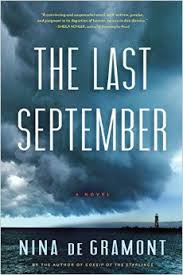 Nina de Gramont’s novel The Last September is due out next week. It has gotten some great early reviews and here’s the latest, a starred review from Library Journal:
Nina de Gramont’s novel The Last September is due out next week. It has gotten some great early reviews and here’s the latest, a starred review from Library Journal:
“In her latest stunning novel, de Gramont (Gossip of the Starlings) wastes no time. Brett Mercier, a brilliant academic specializing in Emily Dickinson, is a young widow with a 15-month-old daughter. Her husband, Charlie Moss, has been murdered on Cape Cod. The likely suspect is Charlie’s younger brother, Eli, who was Brett’s best friend in college before he was all but lost to the ravages of schizophrenia. From Brett’s love-at-first-sight teen crush on girl-magnet Charlie through the heartbreak of his years-long elusiveness to her brief engagement to safe, wealthy Ladd Williams, whose family is tied to that of the Moss brothers on the Cape, to Charlie’s murder, the mystery unfolds with unexpected detours. The torture of unanswered questions resulting from violent death is on full powerful display, as are Brett’s torn loyalties—to the terribly ill Eli, to the devoted fiancé she spurned, to her irresistible, unfaithful late husband—that threaten her stability. VERDICT With an artist’s eye and a poet’s heart, de Gramont realizes a world of love, mystery, and the shattering sorrow of mental illness, deceit, hope, and lives cut short. Impossible to put down.” Continue reading →
Bad Advice Wednesday: One Sentence on Getting Back to Work, September Style
categories: Bad Advice / Cocktail Hour
comments: 1 comment

Like Daughter Like Father
I still get that September back-to-school feeling about now, even though I’m not teaching anymore, that feeling of gearing up, getting ready, pencil boxes and notebooks and ink for the fountain pen (I started grade school in 1958), a dog to walk you to school Norman Rockwell style, maybe even a lamb, as in Mary had a Little, all with a stout resignation—summer might not be over, but the time to work is here, the time to stack projects like cordwood, the time to make those calls, finish that book, wake the slumbering beasts, polish an apple or two, look out for the red-haired girl, be a writer at the desk and not so much a writer at the beach, a writer who’s gonna get it done, and get it done, and get it done, then ask for more. Continue reading →
Letting the Delta Die to Save It
categories: Cocktail Hour
comments: 2 comments

IDL TIFF file
By Guest Poster Jimmy Guignard (Cartoon head coming…)
When Katrina hit the coast in 2005, I was in Pennsylvania packing up to head to North Carolina for a short visit before the semester got away from me. The phone rang. My brother, Billy, said, “Hey, man, you don’t want to come down here. We’ve got no gas.” Holy shit, I remember thinking. I had been following Katrina a little—I hadn’t lived on a coast in years, so I no longer tracked storms for their surfing potential. But my brother’s warning pushed me to read obsessively about the hurricane’s impact. Horrifying.
This is the 10 year anniversary of Katrina, and not surprisingly, the storm and its aftermath have been prominent in the news. President Obama made a trip to New Orleans to say that we’ve made progress though we have work to do and Michael “Heckuva Job, Brownie” Brown explained why nothing was his fault.
Guy at the Bar: Vince Passaro on Harold Brodkey, Gordon Lish, and Pat Towers, Middle of the Night
categories: Cocktail Hour / Guest Columns / Guy at the Bar / Reading Under the Influence
comments: Comments Off on Guy at the Bar: Vince Passaro on Harold Brodkey, Gordon Lish, and Pat Towers, Middle of the Night

Lish
Up tonight, knee shaking, foot shaking. I think Trader Joe spiked my decaf. So it’s 1:00 a.m. when I start thinking about Harold Brodkey — does anyone think about Harold Brodkey anymore? All artistic talent of the first order is incomprehensible but certain talents strike us as more familiar and approachable than others. George Orwell, for instance, whose prose’s muscle and clarity — clarity above all — affected me strongly, does not mystify me. I have a solid sense of where he came from, where his language came from, his general mode of thinking. Brodkey’s particular genius remains ungraspable. The language is Jewish, it’s American, it’s baroque, it’s beautiful and divine. Divine I mean as in suffused with a spiritual force and a spiritual necessity above that mustered by mere mortals. It is miraculous and harrowing: to look into his work is like watching a great surgeon, a world class surgeon, magically operate on himself, remove his own organs, examine them in bloodied hands, drop them in a pan. Continue reading →
Bad Advice Wednesday: Waiting for an Audience
categories: Cocktail Hour
comments: 6 comments
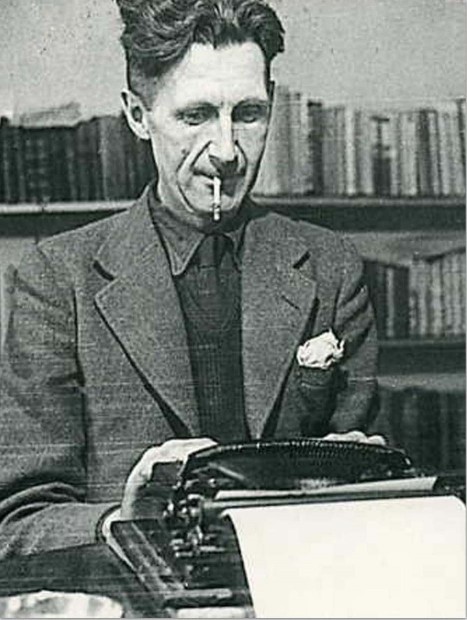 Readers of Bill and Dave’s Cocktail Hour, I need some bad advice. I have just completed the copyedits for my forthcoming book, which means all that remains will be to check the proofs and create the index. Those are pain-in-the-ass jobs, but don’t require much intellectual or emotional investment. All of the heavy lifting, the drafting and revising and editing, have been completed at this point.
Readers of Bill and Dave’s Cocktail Hour, I need some bad advice. I have just completed the copyedits for my forthcoming book, which means all that remains will be to check the proofs and create the index. Those are pain-in-the-ass jobs, but don’t require much intellectual or emotional investment. All of the heavy lifting, the drafting and revising and editing, have been completed at this point.
So now here I am attempting to launch the new project. In one way of the other, this project will involve a reappraisal and appreciation of the work of one of our most famous writers of the 20th century, George Orwell. I want to rescue him from Animal Farm and 1984 (which is not to say they are not great books, as they are) and help recover the George Orwell that I think really matters to our modern age: the man who worked and lived among the poor, wrote eloquently about the daily humiliations and injustices of poverty, and believed that nature had the power to rescue us from the economic inequality. It’s an Orwell that his most devoted readers will know well, but that the average reader of his work has likely never encountered, or only knows through the descriptions of the proles in 1984 and the working livestock in Animal Farm.
Anxious Bode Goes Electric!
categories: Cocktail Hour / Guest Columns / Jukebox
comments: 1 comment

Thierry Kauffmann, aka Anxious Bode
Guy at the Bar: AWP and Diversity. Does No One Out There Have Any Sense?
categories: Cocktail Hour / Guest Columns / Guy at the Bar
comments: 3 comments
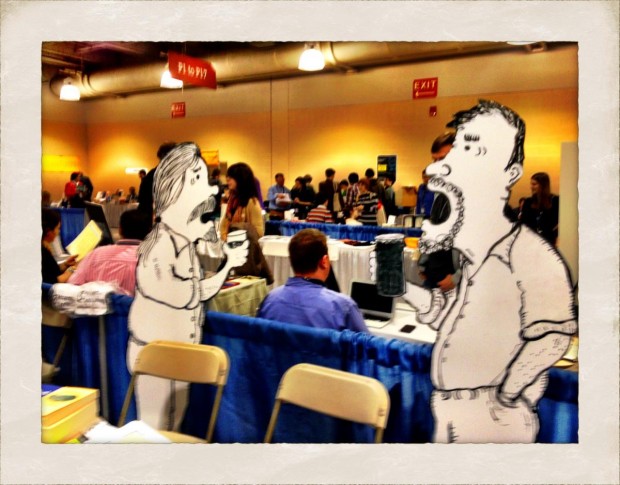
Bill and Dave at AWP Boston
AWP — who gives a fuck? (There’s a little so-med shitstorm about Kate Gale’s not altogether sensitive piece in The Huffington Puffington I’llBlowYourHouseDownington Post about AWP “diversity” — about which I guess I give enough of a fuck to write this.) Here’s some news: AWP–the Association of Writing Programs–is an association of MFA programs. It looks like an MFA program, it walks like an MFA program, it talks like an MFA program, what’s the issue here? It’s bureaucratic and uninteresting and being twice removed from the actual task and demand of creative writing, it is in every way an “organization”, handing out tote bags and missing the point. In any case, further news for the uninitiated: MFA programs charge a lot of money and keep two thousand writers employed with 403Bs and good medical plans and good cars and nice refrigerators. (As the familiarly-initialed WPA briefly tried to do, but way less intrusively.) In all but a handful of cases the programs are designed as not-great-but-steady profit centers for universities who have to spend money on students in other (liberal arts, non-professional) programs. Therefore students face high tuition costs. So what do people expect its representative organization to look like? A social services agency? Many MFA students are cash poor and go into hock up to their necks to study writing with teachers and fellow students whom they admire and hope to be enlightened by; I did this once, though it wasn’t so expensive then. (That’s how I met Bill Roorbach!) But if you come from a place that is poor, if everything and everyone you’ve ever known is poor, it takes a particularly rare kind of cognitive and cultural leap to go $20-40,000 in debt, or more, to get into a profession that doesn’t pay and never will. As such a poor person, you would have had to have done this already for your BA in most cases, so the odds are really low. Does no one out there have any sense? AWP stands for All White People, because as Kate Gale put it, so amusingly cluelessly, that is us. Continue reading →


